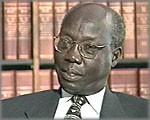US Congress inaugurates “Sudan caucus”
Oct 19, 2005 (WASHINGTON) — Members of US Congress inaugurated the first “Sudan caucus” to try to focus attention on that embattled country, which despite a truce still struggles for true peace after three decades of civil war.
 “This is not about Sudan, which is a small part of the world and not important. This is about humanity,” said Rep. Michael Capuano of Massachusetts, one of four chairmen of the bipartisan caucus.
“This is not about Sudan, which is a small part of the world and not important. This is about humanity,” said Rep. Michael Capuano of Massachusetts, one of four chairmen of the bipartisan caucus.
What is happening, Capuano and others said Wednesday, is that the government of President Omar el-Bashir is pulling back on agreements he made in January since the rebel leader, John Garang, died in a July plane crash three months after he was sworn in as Sudan’s first vice president.
Garang, a black African like most other southern Sudanese, was the first Christian vice president for the country run by Arab-descended Muslims.
The members of the House of Representatives also are denouncing violence in the western Sudan region of Darfur, which began in 2003, even while the North-South negotiations were in progress.
Capuano said, “I find embarrassing as a human being” that the Sudanese government is not being held accountable for Darfur or for lack of full implementation of the peace agreement with the south.
The United States described the Darfur situation as a genocide last year and blamed it on the government’s failure to stop attacks on Darfur civilians by alleged government-backed marauders. Estimates of the fatalities in Darfur run to 180,000, many dead from hunger and disease.
U.S. military aircraft have been used to fly in members of an African Union peacekeeping force, which has been largely ineffective because it is too small and too poorly equipped.
“I believe American troops should be on the ground in Sudan, not because we want to be there, but somebody’s got to do it,” Capuano said.
Ken Isaacs, head of the office of foreign assistance of the U.S. Agency for International Development, said he just returned from Sudan, where he found a “deteriorating security situation.”
“The United Nations has declared a no-go zone in Darfur for its workers,” he said, and he expects no significant return of its people in 2006 under current conditions, he said.
He urged the caucus to work toward keeping U.S. aid flowing both to Darfur, where violence continues, and to southern Sudan, where former rebels are struggling to implement the peace agreement despite government efforts to renegotiate.
“It is very important that the government be held accountable for what it has agreed to,” USAID’s Isaacs said.
Among provisions of the document was to pass the vice presidency to Garang and give the south six years to decide whether to remain in the union or opt for independence.
A Sudanese scholar, Francis Deng — who was Sudan’s former ambassador to Canada, the Scandinavian countries and the United States — said a recent trip back to his home country taught him that the Sudanese realize that the two-decades-long civil war could not have been ended without the prodding of the United States.
Isaac said he went during his recent trip to Juba, the main city in southern Sudan, and sat in on the opening of what, under the peace agreement, is to be the autonomous region’s parliament.
He said James Wani, speaker of the assembly, spoke of the U.S. role in the Sudan peace deal by quoting a Sudanese saying: “Even a leopard without teeth will have a goat for a friend.”
Isaacs said Wani went on: “The Americans are the teeth of our movement.”
(AP/ST)
